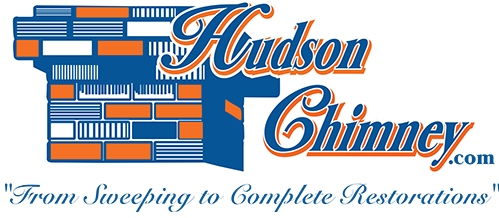by Mark Hudson | Jun 24, 2015 | Chimney Smells
In the summer, our staff at Hudson Chimney gets a lot of questions from our customers asking why their chimneys are so smelly. Several things can be behind unpleasant chimney odors, and these bad smells entering your home through the chimney and fireplace are intensified by the heat and humidity of summertime. Our certified chimney sweeps are very experienced with stinky chimneys and fireplaces, and they understand how to get rid of any bad odors from your hearth. To help you understand how chimneys can be smelly enough to affect the living spaces of your home, we would like to tell you more about the reasons behind stinky chimneys.

NEGATIVE AIR PRESSURE
How do unpleasant odors enter your home through the fireplace and chimney? The answer to this question is negative air pressure in your house. If you seal up your home too tightly during the weatherizing process to prepare for the summer by keeping the cold air conditioned air indoors, this can force smoky air to enter your home from the fireplace instead of exiting out the chimney because the air has no way of escaping. Our chimney technicians at Hudson Chimney know how to deal negative air pressure problems. We have found that installing a top-sealing damper will promote proper air circulation and eliminate issues with negative air pressure.
CREOSOTE
Creosote is a natural compound that forms as a result of the combustion and condensation processes that occur when burning wood, according to the Chimney Safety Institute of America (CSIA). Made up of amorphous carbon, creosote clings to the inner walls of your chimney and will form large deposits if you allow them to accumulate by not scheduling a professional chimney sweeping every year to have them removed. These deposits are not just dangerous because they are extremely flammable, but they also smell badly. Creosote gives off a sour, acrid odor which is worsened by heat and humidity in the summer. Our CSIA-certified chimney sweeps at Hudson Chimney can easily take care of this problem by performing a thorough chimney cleaning and removing the source of this unpleasant smell.
OTHER CAUSES OF BAD ODORS
If you notice musty odors, your chimney may be suffering from chimney leaks. To prevent water from rain and melted snow from penetrating your chimney to create bad smells, our chimney technicians at Hudson Chimney can protect your chimney from water leaks by installing a chimney cap on the top of your chimney. This chimney cap will also prevent birds and animals from getting into your chimney to nest, which also causes unpleasant odors. Debris from their nesting materials and their droppings can smell badly, and in a worst case scenario, a bird or animal could possibly get trapped within your chimney and even die. This situation will result in very unpleasant odors within your chimney that could affect the living spaces in your home.
Do you have a smelly chimney? If so, contact Hudson Chimney so we can diagnose the odor problems and make your living situation better.
by Mark Hudson | May 8, 2015 | Chimney Leaks
Do you have a masonry chimney? If you do, you may already know that the likelihood of having a leaky chimney can be quite high. Why are masonry chimneys so likely to experience water leaks? The Chimney Safety Institute of America (CSIA) answers this question by stating that water is the biggest enemy of a masonry chimney. Every component of your chimney can possibly suffer expensive and extensive damage when water penetrates into your chimney. Stained ceilings or walls, loose bricks and chipped mortar on the exterior of your chimney, and musty or moldy odors coming from your fireplace are all signs of a leaky chimney. If you have seen any of these signs, it is crucial to contact a professional chimney company like Hudson Chimney to locate the source of the leak and make repairs so that your fireplace and chimney system can function safely and properly. But, what exactly can lead to a leaky chimney? We would like to tell you four problems that allow water to easily penetrate your chimney.

1. DAMAGED OR MISSING CHIMNEY CAPS
Chimney caps are your least expensive preventive measures against water penetration because they cover the top of your chimney. Freezing temperatures and destructive animals trying to get into your chimney can cause cracks and other damage your chimney cap. When your chimney cap is damaged (or even worse, missing completely), water from rain and melted snow can easily get into the masonry work of the interior of your chimney. Hudson Chimney offers a wide variety of chimney caps, and our certified technicians can install a custom-fitted cap to protect your chimney from water leaks.
2. DETERIORATED CHIMNEY CROWNS
Located directly beneath the chimney cap, a chimney crown is constructed from concrete and used to seal the opening of your chimney. Unfortunately, your crown could be made from the wrong or ineffective material, or it could be improperly installed. In these situations, damage and deterioration will occur sooner than later, and you will have an opening to your chimney where water can easily enter. The masons at Hudson Chimney can repair damaged chimney crowns as well as correctly install custom-made crowns to keep the water out of your chimney.
3. DAMAGED FLASHING
Flashing is sheeting made from metal that is placed between your chimney and your roof to protect this area from water leaks. Easily improperly installed, not every chimney company will the time to customize the flashing itself for a perfect fit. Our technicians will customize flashing by carefully measuring each part of your chimney and its surrounding areas on your roof so that it fits exactly and leaves no holes or cracks, which allow water penetration of your chimney.
4. WORN OUT MORTAR JOINTS
Water deteriorates the essential mortar joints that hold your chimney together and creates holes and cracks within the masonry. In the winter, water trapped in your chimney freezes and thaws, which leads to the bricks breaking and crumbling, and this will cause even more water leak problems. Fortunately, Hudson Chimney can do masonry repairs using the tuck pointing process. Once we have completed these repairs, we can apply a waterproofing treatment that will ensure that your masonry work in your chimney is protected from any water leaks in the future.
Dealing with a leaky chimney? Contact Hudson Chimney to schedule a visit from one of our certified masons to fix your water penetration problems.


